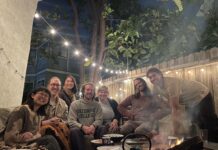
Last month, we published Verena’s aspirations to follow the Fourteen Mindfulness Trainings in her daily life and to ordain into the Order of Interbeing.
Below is her version of the Fourteen Mindfulness Trainings, a living document that she uses for her practice. It does in no way replace the official version of the Fourteen Mindfulness Trainings, which can be found here.
The First Mindfulness Training: Openness
I am deeply committed to training myself to look at everything with openness and the insight of interbeing in order to transform dogmatism, and violence in myself and in the world. I am aware that everyone on this Earth is trying in his or her own way to be happy and to reduce suffering. We all have the same wholesome and unwholesome seeds in our store consciousness. Through different circumstances, we developed different views and strategies to arrive at happiness, and different conditions make us feel safe, seen and connected. The Buddhist teachings are guiding means to help me develop my understanding and compassion, cultivate joy and inclusiveness. This does not mean that these teachings are superior to other teachings, nor is their wisdom unchangeable. I have been very fortunate to receive many positive qualities from my ancestors and still struggle every day with the challenges that they have also passed on to me. I am no different from others in this respect. When I hear myself thinking “I am not like that,” I know I can return to “Are you sure?”
The Second Mindfulness Training: Non-attachment to Views
I am determined to practice open-mindedness and allow my views to be impermanent, and be enriched by new insights in interaction with others. “None of us knows more than all of us” is a wisdom of the heart rather than of the intellect. I am deeply aware that the knowledge I presently possess is not changeless, absolute truth, and that being alive means learning and transforming. Through the practice of compassionate listening, deep looking, and letting go of notions, I am deeply in touch with the present moment and the truth that is found in the here and now. I do not need to test this experience against a theory or draw conclusions that give me a false sense of control and safety. “Not-knowing” gives me a freedom to experience this moment just as it is.
The Third Mindfulness Training: Freedom of Thought
I am deeply committed to live the view that different opinions can coexist peacefully. Aware of the suffering in me, when I feel that another person is trying to impose their views on me, I am determined to look deeply at the seeds that are being touched and not react until I have regained some peace and stability. I will listen deeply to try and understand the reason for this person’s behavior. I will not make another person’s suffering my responsibility since I know this waters the seeds of my habit energy of trying to “fix” his or her problems “my way.” I am aware that compassionate listening is my most important tool when I am confronted with fanaticism and narrow-mindedness. If I can remind myself that being kind is more important than being right, I may be of some help in those situations.
The Fourth Mindfulness Training: Awareness of Suffering
When a situation makes me feel uncomfortable, I am determined to go back to my breathing and ask myself “How do I practice with that?” to remind myself that taking care of myself is essential in having a positive influence on the outcome. I am deeply aware that ignoring my emotions to stay available to the other person may inadvertently influence the situation in a negative way. When I need more space to take care of myself because I am suffering from strong emotions, or I lack the energy to sufficiently take care of them in that moment, I will practice compassion for myself by taking this space and not forcing myself to stay in the difficult situation. Once I have taken care of my own suffering in a gentle, embracing and accepting way, I know I will have the space to be truly present with and for those who are suffering. I will use skilful means to communicate and choose wisely between the options of WhatsApp, email, telephone, Skype, or meeting face-to-face. In this way, we will both have a chance to transform our suffering into compassion, peace, and joy gradually in our own time.
The Fifth Mindfulness Training: Compassionate, Healthy Living
Aware that true happiness is rooted in peace, solidity, freedom, and compassion, and that joy can be nourished by connecting wholeheartedly with Sangha friends, I am determined to live simply and not use more resources for my daily life than I need. I will remind myself that I have more than enough conditions for happiness available in the here and now, I will try to limit my exposure to advertisements or other stimuli that water the seeds of consumerism in me. I will practice diligently to grow my understanding of my habit energies related to how I nourish my body and mind, holding gently the fact that I am practicing with and for all generations (past and future) present in me. I am determined to water the wholesome seeds by choosing non-processed organic (non-toxic) foods and drinks as much as possible; by choosing films, books, music, websites, friendships and chance-interactions that cultivate a sense of optimism, connection and love; and by creating spaces in my life to rest, reflect, and connect to nature. I will try to refrain from watering unwholesome seeds and allow myself to begin anew every day in doing so.
The Sixth Mindfulness Training: Taking Care of Anger
When the seed of anger is touched and manifests in me, I am determined to return to my breathing and embrace it. If necessary, I will remove myself from a situation where the seeds of anger are watered any further in a skilful way. I will refrain from feeding my anger with thoughts of blame or being a victim. I will hold my anger gently like a crying baby and try not to push it away or fix it, reminding myself that feeling anger is part of being human and is not necessarily a sign of failure. I know I do not have to understand right away, so I can relax and trust that insight will come. I am aware that once I understand the roots of my anger—namely my wrong perceptions—and seeds of suffering in my store consciousness that have been touched, I can also grow to understand the suffering of the other person. By stopping, creating space, and acting from the heart, instead of reacting out of habit energy, I can nourish my understanding, love, joy, and inclusiveness, and preserve and grow the precious connections that I have with others.
The Seventh Mindfulness Training: Dwelling Happily in the Present Moment
When I stop, sit down, and look around, it is so easy to touch the wondrous, refreshing, and healing elements that are inside and around me in all situations. The chatter in my head will quiet down by itself. I know that especially when I am tired and/or stressed, I have a tendency to lose myself in dispersion and lack the discipline to meditate and/or rest. I am then easily carried away by my own stories about the past, worries, or dreams about the future, or feelings of sadness in the present. If I take care to get enough sleep, everything is easier. Cultivating seeds of joy, peace, love, and understanding in myself will effortlessly support transformation and healing in my consciousness. Practicing gratitude for all the beautiful connections in my life waters the flower of seeing that I already have more than enough conditions to be happy.
The Eighth Mindfulness Training: True Community and Communication
Knowing that true community is rooted in inclusiveness and in the concrete practice of the harmony of views, thinking, and speech, I will practice looking deeply into my views on how to organise, communicate, and be together and listen deeply to the needs, views and suggestions of others. Knowing that renewing the energy of the Sangha is just as important as having a solid base together, I will practise letting go of habits that are not fundamental to our happiness. I will be open to experimenting with new ways of practicing playfully and joyfully, while being conscious of my own needs for safety, feeling included and a sense of togetherness, and expressing those in a wholesome way.
I am determined to learn to listen deeply to myself and others in the Sangha, and make space for what comes up, knowing that I do not need to act on it immediately; I am allowed to take time to breathe with it. I will refrain from uttering words that can create discord or cause the community to break, and instead will keep the energy of curiosity and openness to other views alive in my thinking, speaking, and acting. I will practice flower-watering frequently—be it formally or informally—to keep our Sangha flowers fresh and lively. Whenever difficulties arise, I will remain in my Sangha and practice looking deeply into myself and others to recognise all the causes and conditions, including my own habit energies that have brought about the difficulties. I will take responsibility for the ways I may have contributed to my own or other people’s suffering, and keep communication open. I will not behave as a victim, but I will be active in finding ways to reconcile and resolve all conflicts. Any suffering that will affect our future together is worth making an effort to resolve and transform it.
The Ninth Mindfulness Training: Truthful and Loving Speech
My intention is to use only words that inspire joy, confidence, and hope as well as promote reconciliation and peace in ourselves and among other people. Whenever I hear myself think in a negative way with anger, frustration, or blame, or any kind of dualistic thinking, I will go back to my breathing and recognise what is happening by saying the words “I have an opinion about that.”
I am determined not to say untruthful things out of fear, shame, or pride. I will protect the happiness and harmony of our Sangha by refraining from speaking about the faults of other people in their absence, and I will always ask myself whether my perceptions are correct.
The Tenth Mindfulness Training: Protecting and Nourishing the Sangha
Aware that the essence and aim of a Sangha is the realization of understanding and compassion, I am determined not to use the Buddhist community for personal gain—be it financial, political, or as a way to fulfil unwholesome emotional needs. I am committed to learning to look with the eyes of interbeing, and to see myself and others as cells in one Sangha body. I will not see my own Sangha, nor my own tradition of practice, as superior to other Sanghas or traditions. Nor are we inferior or equal. As a true cell in the Sangha body, generating mindfulness, concentration and insight to nourish myself and the whole community, I am at the same time a cell in the Buddha body. I will actively build brotherhood and sisterhood, flow as a river, and practice to develop the three real powers—understanding, love and cutting through afflictions—to realize collective awakening.
The Eleventh Mindfulness Training: Right Livelihood
Aware that doctors are generally trained to fight disease and suppress symptoms rather than to promote health and remove causes of disease, I will try to promote happiness and relieve suffering to the best of my abilities as an elderly care physician. Being fully present, listening deeply, and speaking from a place of compassion and understanding are more important tools for me rather than pharmaceutical interventions. I feel deeply grateful that my vocation is in harmony with my practice in that way; I also realise that the way I raise my children, how I treat my neighbours & friends, and my activities for Wake Up may be of even more value for future generations. I am determined to behave responsibly as a consumer and as citizen and will not be discouraged by knowing that even with all my efforts to do good, my knowledge of how things are produced and which choices are beneficial, or un-beneficial, is limited. I aim not to invest in or purchase from companies that contribute to the depletion of natural resources, harm the earth, or deprive others of their chance to live. I am investing my time, energy, and enthusiasm in creating a living community, where we can practise and grow together in a sustainable way.
The Twelfth Mindfulness Training: Reverence for Life
I am determined to cultivate nonviolence, compassion, and the insight of interbeing in my daily life and promote peace education, mindful mediation, and reconciliation within families, communities, ethnic and religious groups, nations, and in the world. When I hear someone use words containing racism, division, or discrimination, I will gently challenge them and question them in order to understand what makes them speak or act in such a way. I will not support any act of killing in the world, in my thinking, or in my way of life. I will diligently and compassionately practice deep looking with my Sangha and my family to discover even more ways to protect life, prevent conflict, and build peace.
The Thirteenth Mindfulness Training: Generosity
Aware of my very fortunate circumstances of living in a safe country, having had the opportunity to receive an excellent education, having a place to live, having enough to eat, having a beautiful path of practice together with Sangha friends, and being healthy and energetic, I am immensely grateful and do not take these conditions for granted. This gratitude easily overflows in my way of thinking, speaking, and acting, and I love to create art, newsletters, events, and retreats in our tradition in order to share my joy, happiness, and practice with others. By sharing my material resources, I water the seeds of “having enough.” My experience is that if you share joy, it multiplies! I have experienced deeply that I also need to rest, and create space for silence and reflection. When my offering comes from a place of solidity and freedom, sharing and connecting with others is my favourite way of being the change and guarantees to water my seeds of happiness.
The Fourteenth Mindfulness Training: True Love
A heart filled with love can contain the whole universe.
I am committed to nourish my openness and curiosity, and remind myself again in every moment that there is always more to learn about the person in front of me. I will not be caught in ideas of what a friendship and / or a relationship should look like and stay in this moment to enjoy whatever our current connection brings. I will return to my own needs frequently and check whether I am nourished by this encounter, and to take care of feeling spacious and safe. I will try my very best to nourish our connection with loving kindness, joy, inclusiveness and compassion, recognizing that freedom and impermanence are important ingredients in all these aspects of true love. I will keep the awareness alive that—even though I am not perfect and will never be—I am worthy to receive love, and that the love I have to give is good enough.
When entering into a romantic relationship, I fully accept that to know and understand my feelings completely, I need time and space with the other person and by myself. To connect to, understand, accept, and love each other, we open up to each other in various circumstances over time, surrounded by family and friends. I know that respecting the rights and commitments of myself and others will support both our happiness. This includes respecting our aspirations, preferences, path of suffering, and transformation and freedom.


















I am so happy to have these fourteen mindfulness trainings so precisely and concisely presented on one page. I am bookmarking this. With many thanks, Tom.
Thank you, Verena, for your wonderful practice – please send your article to the OI UK forum – I am sure that others will be happy to know you are there, with WakeUp inventiveness, insights and aspirations … with love and a LoadofLotus
Teri